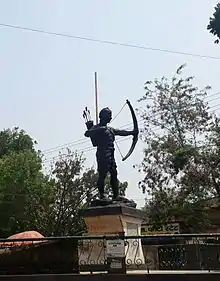Tilka Manjhi
Baba Tilka Majhi (or Jabra paharia) was the first Adivasi leader who took up arms against the British in the 1784, around 70 years before Mangal Pandey. He organized the Adivasis to form an armed group to fight against the resource grabbing and exploitation of British.[1]
History

The year 1784 is considered as the first armed rebellion against the British and was the beginning of Paharia. It was due to great famine in 1770 and the consequences of Court of Directors orders influenced by William Pitt the Younger -- Court of Director issued ten year of the settlement of Zamindari and later in 1800 - this resulted in minimum chance to negotiate between local Zamdindars and Santhal villagers. Baba Tilka Majhi attacked Augustus Cleveland, British commissioner [lieutenant], and Rajmahal with a Gulel (a weapon similar to slingshot) who died later. The British surrounded the Tilapore forest from which he operated but he and his men held them at bay for several weeks. When he was finally caught in 1784, he was tied to the tail of a horse and dragged all the way to the collector's residence at Bhagalpur, Bihar, India. There, his lacerated body was hung from a Banyan tree.[2]
A statue to him was erected at the spot where he was hanged, after Indian independence, which is nearby residence of S.P. Bhagalpur and named after him. Also the Bhagalpur University was renamed after him - Tilka Manjhi Bhagalpur University.[3] Another statue was established in dumka town, Jharkhand.[4]
References
- "Tilka Manjhi: India's First and Forgotten Freedom Fighter". Madras Courier. 7 March 2018. Retrieved 11 October 2019.
- "Biography of Tilka Majhi (1750 – 1785)". India Study Channel. 7 October 2014. Retrieved 11 October 2019.
- "TILKA MANJHI BHAGALPUR UNIVERSITY AT A GLANCE – Tilka Manjhi Bhagalpur University – TMBU – Bhagarlpur – Bihar". Tilka Manjhi Bhagalpur University – TMBU – Bhagarlpur – Bihar – TMBU Official website. 12 July 1960. Retrieved 11 October 2019.
- Goutam Sarkar (15 August 2007). "Identity crisis for freedom fighter". telegraphindia.com. Retrieved 11 April 2017.